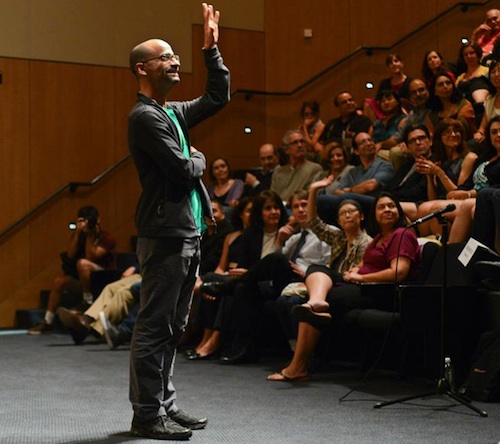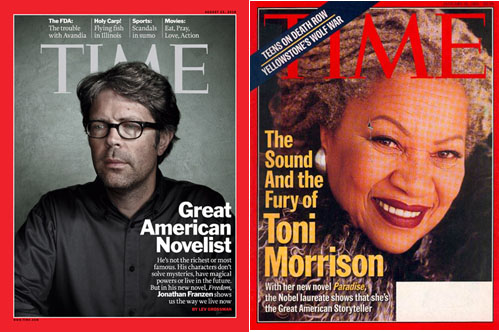
Image from TILTS.
If you attend enough talks and readings, you start to get pretty familiar with the basic elements of the Q&A session: the rambling question; the non question; the irrelevant question; the already-answered question; the indecipherable question; the adoring fan question; the tiny soapbox disguised as a question. If you’re cynical like me, you’ve realized by now that most questions are asking something very different from what they claim to ask. Q&As with contemporary writers always contain at least one version of the following: What’s your writing process like?/How often do you write?/Where do you write?/What do you wear whilst writing?/What snacks do you eat?/How productive are you?/Do you wear socks? You get the picture.
This type of question amounts to one thing, in my mind: a budding writer is desperate for the secret key to writing success. “Tell me, how do you do it?” It tends to come off, in my experience, as either a) amateurish, b) flirtatious, c) stalkeresque, or d) some hideous combination of the three. Why is it so much more pressing to find out how a writer writes than it is to hear about what or why she writes?
I think, in part, this stems from a desire to visualize the writer as he or she creates content that speaks to us. Perhaps it’s as innocent as seeking a material connection with a person to whom you feel connected on the page. Fielding an unwieldy question about universality during his TILTS Q&A on race Tuesday morning, Junot Díaz hit upon the following: when a person talks about a writer’s universality or universal reach, what he really means is not that a writer is able to speak for all of human experience, but rather that he speaks to the particular experiences of "at least two people," the writer and the reader.
Which means that the person in the back with her hand raised is really just shopping for images. She wants to get a better image in her mind of how the writer looks when he’s crafting language that speaks to her; she wants to know how she might (at best) offer the same kind of connection to others, (at worst) look like she’s doing so. Do you use a pen or a computer? Does it make a difference what time of day you write? Where'd you get those shoes? How many drafts? What price bananas?
Díaz, who described writers and scholars who work explicitly on race and white supremacy in the contemporary moment as “salmon in a fuckin’ desert” (i.e. they can’t even find the stream to swim up), referred to novelist Jonathan Franzen’s prominence as an example of the continuing marginalization of race in contemporary culture. The writerly image maintains its hold over the imagination, but the conversation has yet again stalled in an unending debate around the “Great American Novel,” a category that implies some kind of universal (read: white, male, heteronormative) American experience while denying the plural particulars of any actual experience. References to the GAN perpetuate the same image of the writer that a person who asks about writing process is looking to buy. At the root of this question is the assumption that writing, like many other so-called American dreams, is for sale not to the most talented or to the hardest worker or to the person with something to say, but to the one who has the secret password, the right look, or the right technique.

Images from Time Magazine covers archive.
I find the consumerization of creative practice to be an extremely sad thing. And Díaz really impressed me with his answer to this question, and the answers he gave to the follow-up chorus of questions around the room that amounted to how can we write (or teach) like you for the audience that matters to us—that is, how can we speak to the particularities of black or female or gay or transgender experience in a meaningful way—when the most recent writer on the cover of Time isn’t Toni Morrison, like it was in 1998, but is instead none other than J. Franzen himself (who, I should mention, I’ve never read, which makes it a lot easier to speak not to his work but to the cult of image he represents in literary culture) with the words “Great American Novel” plastered under his face, claiming that his furrowed brow speaks for “the way we live now”?
See what I mean about the question that disguises its intentions? The implications of Díaz's answer would take awhile for me to get into, but, basically, he suggested that therapy, self-care, and taking the time to process your own experiences are the most important means for channelling what you care about into writing. Which is a great answer, and one of the best I’ve heard, and certainly one that requires more work than having a rigorous writing schedule, say, or using a particular brand of notebook. It suggests that the way to write or teach the things that matter most to you isn't a matter of time or talent or equipment. Rather, his answer implies that by delving into the personal and analyzing the things that have affected you, you will find the best way to communicate your experience.


Recent comments
2 years 29 weeks ago
2 years 44 weeks ago
2 years 44 weeks ago
2 years 50 weeks ago
3 years 4 weeks ago
3 years 4 weeks ago
3 years 4 weeks ago
3 years 6 weeks ago
3 years 6 weeks ago
3 years 6 weeks ago